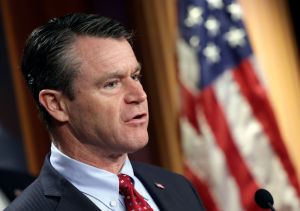
WASHINGTON, DC — Republican Senator Todd Young of Indiana recently spoke out against the Biden Administration’s revised Waters of the United States (WOTUS) rule. In his speech, Senator Young argued that the new rule, announced by the Environmental Protection Agency (EPA) and the U.S. Army Corps of Engineers in December 2022, will make it more difficult and expensive for farmers to feed the world.
The revised WOTUS rule changes the definition of Waters of the United States and expands federal regulatory authority. Senator Young accuses the Biden Administration of overreach and argues that the new rule is an attempt to expand the reach of the federal government over the lives and activities of Americans. He has been a leading opponent of the WOTUS rules since the Obama Administration and recently cosponsored a resolution of disapproval under the Congressional Review Act that would repeal the Biden Administration’s new WOTUS rule.
In his speech, Senator Young cited the example of James Ramsey, a farmer and small business owner from Rush County, Indiana. Ramsey and his family have been farming and maintaining the same land since the 1860s and have grown their business to employ eight people. They also run a small business helping farmers and counties with drainage installation, ditch digging, and land clearing, improving water quality and soil health. Senator Young argued that the WOTUS rule will interrupt success stories like Ramsey’s by increasing overhead costs, prolonging permitting processes, slowing or even stopping projects, and ultimately leading to laid off employees.
Senator Young called on the Biden Administration to reverse course and rescind the new WOTUS rule, stating that farmers are asking for clarity and an even-handed approach to regulation that respects the environment and allows them to grow.
The WOTUS rule has been controversial since it was first introduced in the Obama Administration, with supporters arguing that it provides necessary protections for clean water and opponents claiming that it imposes unnecessary burdens on farmers and businesses.
















